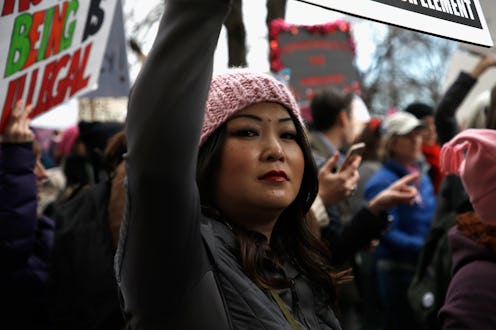
A number of everyday products — from beer kegs to lawnmowers — could see a significant price increase this week after Donald Trump imposes tariffs on various Chinese imports. The 25 percent tariffs could also make birth control more expensive under Trump, whose preliminary target list for tariffs included birth control pills.
Prasad Pinnamaraju is the COO of Novast Laboratories, which according to Politico is a U.S. subsidiary of Chinese pharmaceutical company Novast Holdings. Pinnamaraju told Politico that if Trump's proposed tariffs go into effect, women could have a much more difficult time accessing their birth control prescriptions. Novast, for example, reportedly supplies up to 20 percent of the birth control pills currently available on the U.S. market.
“Given our market share and the heavily regulated nature of suppliers to the market, there is a high risk of a shortage of supply, at least for some period of time,” Pinnamaraju told Politico. “This means, at some point, a woman will go into her pharmacy and not be able to obtain her birth control medication.”
According to Politico, American trade officials claimed that the new tariffs would have a much more significant impact on Chinese producers than on American consumers. However, The Washington Post reported that the tariffs would nonetheless result in economic fallout in key states — especially any tariffs concerning auto imports.
Trump is slated to reveal his final list of tariffs on Chinese goods on Friday; the list is expected to target nearly $50 billion in goods. Ahead of his decision, Chinese officials urged the U.S. to make a "wise choice" on trade, warning Trump that their country was ready to respond if the U.S. imposed tariffs. Chinese State Councillor Wang Yi told reporters in Beijing that Trump essentially had two choices.
“The first choice is cooperation and mutual benefit," Wang said, according to Reuters. "The other choice is confrontation and mutual loss. China chooses the first. We hope the U.S. side can also make the same wise choice. Of course, we have also made preparations to respond to the second kind of choice.”
CNBC reported that Trump's proposed tariffs have also fueled existing concerns that the president will withdraw the U.S. from the North American Free Trade Agreement with Canada and Mexico. Earlier this month, the Trump administration introduced tariffs on steel and aluminum on Mexico, Canada, and Europe, prompting Canada's Justin Trudeau to introduce retaliatory tariffs on American goods.
This is far from the first time that the Trump administration has threatened to restrict birth control access, however. Since October, the administration has been fighting to implement rules that would permit most employers, universities, and health insurance providers to deny insurance coverage for birth control for almost any reason. Multiple federal courts have blocked the Trump administration from imposing such rules, with California Attorney General Xavier Becerra describing such policies as "unlawful overreach" back in December. Becerra also insisted at the time that "our work will not end until women are guaranteed the healthcare they deserve.”
Since 2010, the Affordable Care Act has required employers to cover birth control prescriptions for their employees without obliging them to make a co-payment. However, this became an extremely controversial provision that has routinely been targeted by lawsuits, one of which resulted in the Supreme Court's 2014 decision to exempt private corporations like Hobby Lobby.
Nonetheless, the Trump administration has still been unsuccessful in its attempts to restrict access to birth control in this particular way — but the tariffs could have a similar effect. If the tariffs do indeed make birth control prescriptions significantly more expensive, as Pinnamaraju predicted, then women would still have a difficult time accessing the prescriptions they need.